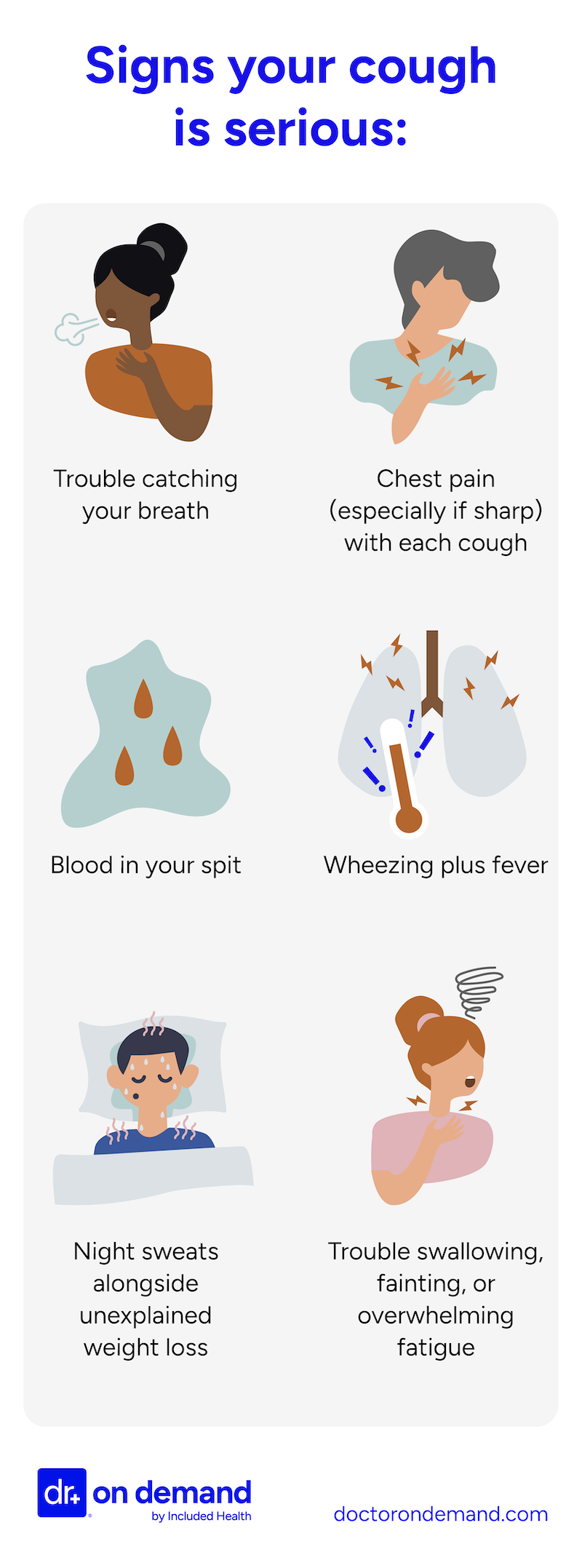Table of contentIn this article
- When to go to the ER for a cough
- Signs your cough is serious enough to go to the ER
- How can hospital ERs help with a cough
- How can I tell if my cough is a sign of a more serious condition?
- What are the high-risk groups for serious issues from persistent coughing
- Home treatments for coughs
- How Doctor On Demand can assist with your cough
- Doctor-answered coughing FAQs
If you have a severe cough, you may wonder whether it’s time to seek medical attention. This guide can help you decide whether to head to the ER, visit urgent care, or use telehealth. It also outlines the signs that mean you need help immediately.
When to go to the ER for a cough
Most coughs aren’t emergencies, but some are. A cough can be the first sign of a more serious condition, so it’s important to know when to take care of it immediately. If you’re having severe symptoms, don’t wait–go straight to the ER and get checked out immediately.
The following situations warrant a trip to the ER:
- You’re gasping for air: If you’re unable to catch your breath, or only able to take short, shallow breaths, that’s a medical emergency. Breathing should never feel like a struggle. If it does, something could be wrong with your lungs, your heart, or both, and you should get checked out by a medical professional immediately.
- Chest pain: This is another major red flag, especially if it gets worse when you cough, breathe in, or lie flat. That kind of pain can point to serious problems, like pneumonia or even a blood clot in the lungs.
- Coughing up blood: This warrants urgent medical attention. It could mean you have an infection deep in your lungs, a blood vessel that’s ruptured, or something more serious.
- A high fever: Especially if it’s paired with confusion, weakness, or lips that turn bluish or gray, this might mean your body isn’t getting enough oxygen.
- Coughing causes you to faint:This is a sign your body isn’t getting enough oxygen.
- Coughing is making you vomit repeatedly: Or if it’s keeping you from eating or drinking, it’s time to get checked, since that could be a sign of pertussis or another serious condition.
- New swelling: Swelling in your feet, legs, or ankles that appears suddenly or worsens over a few days could be a sign of heart failure or fluid building up in your lungs.
- Throat tightness: This, or if it becomes hard to swallow or breathe can be signs of a severe allergic reaction or airway blockage.
- Wheezing paired with a fever: These two symptoms together, orr if you’re experiencing night sweats or unexplained weight loss, can also point to something more serious.
These symptoms are your body’s way of saying something could be seriously wrong. Conditions like pneumonia, pulmonary embolism (a lung clot), pertussis (whooping cough), and heart failure can all begin with a cough, then quickly worsen.
The ER has what you need to get answers fast: chest X-rays, CT scans, oxygen therapy, breathing treatments, and IV medications like antibiotics or steroids. These tools help doctors figure out what’s going on and start treating it right away.
According to recommendations from an international panel with input from patients in the European Respiratory Journal in 2020 titled “ERS guidelines on diagnosis and treatment of chronic cough in adults and children,” a chronic and excessive cough can significantly impair quality of life, so it’s important to get the right help fast.
When to go to urgent care for a cough
Urgent care is a smart choice when something feels off but isn’t an emergency: It’s the right place to go when symptoms aren’t serious enough for the ER, but still need attention. Fast, convenient, and equipped to diagnose and treat common respiratory illnesses, urgent care can help you feel better sooner.
You should go to urgent care if your cough has lasted more than three weeks as that’s too long for most common illnesses. Also, seek care if you have a fever, chills, or feel completely run down. Mucus that’s yellow or green, coupled with a lingering fever, chest congestion or discomfort, or feeling short of breath, could mean an infection. Wheezing, feeling tired all the time, or being slightly short of breath are also signs it’s time to go. The same goes for body aches, night sweats, or if coughing is giving you a headache or making your ribs hurt. Don’t ignore these symptoms — they’re worth a closer look.
These symptoms could mean more serious illnesses, like bronchitis, flu (influenza A & B), RSV, or early pneumonia. Urgent care doctors can check your lungs, do a chest X-ray, and prescribe treatment, including perhaps antibiotics, inhalers, or corticosteroids.
When can you use telehealth for a cough
Telehealth is a smart first step when your symptoms are mild or you just need quick medical advice. It’s convenient, accessible from home, and often all you need to feel better or make the next decision. For many common issues, a virtual visit can save you time and stress.
It’s especially useful when you’ve got flu-like symptoms but can still talk and breathe without a problem. If your asthma or allergies are flaring up and you need a medication refill, a quick video call can help. Not sure if what you’re feeling is serious? A telehealth visit can point you in the right direction without leaving your home.
Telehealth doctors can guide you through your symptoms, suggest home treatments for a cough, such as using a humidifier, drinking tea with honey, or sucking on cough drops or hard candies, and prescribe medications or recommend over-the-counter options such as cough suppressants if necessary. Doctor On Demand is one such service available 24/7.
Signs your cough is serious enough to go to the ER
While most coughs aren’t emergencies, a persistent or severe cough can be the first sign of a serious condition. If you’re experiencing symptoms that seem intense, unusual, or are getting worse quickly, these signs deserve immediate attention, and in many cases, a visit to the ER.
Go to the ER if you have:
- Trouble catching your breath: Struggling to breathe, gasping, or taking only short, shallow breaths could mean an issue with your lungs or heart
- Chest pain with each cough, especially if sharp: This could point to pneumonia, pleurisy, or even a blood clot in the lungs.
- Blood in your saliva: You should get even a small amount of blood checked right away.
- Wheezing plus fever: This could mean a respiratory infection is narrowing your airways or that you have pneumonia or bronchitis.
- Night sweats and unexplained weight loss: These may indicate a chronic or serious infection, especially when paired with a lingering cough.
- Trouble swallowing, fainting, or overwhelming fatigue: These may indicate an airway blockage, a severe allergic reaction, or dangerously low oxygen levels in the body.
These could be signs of COVID-19, pneumonia, pertussis (whooping cough), a pulmonary embolism, or another serious condition. The ER is equipped to diagnose and treat these quickly through scans, oxygen therapy, and/or fast-acting medications. Don’t ignore what your body is telling you and go ahead and get the right help you need.

How can hospital ERs help with a cough
If your symptoms feel urgent or dangerous, go to the ER. It’s not just a place to figure out what’s wrong; it’s where real treatment begins right away. ER teams are trained to move fast, stabilize your condition, and begin appropriate care without delay.
ER doctors can order chest X-rays or CT scans to quickly see what’s going on inside your lungs. If you’re having trouble breathing, they can start oxygen or give you medications to open your airways. They can also give you antibiotics or other medications through an IV on the spot. Your heart rate, oxygen levels, and blood pressure will be checked continuously, and a full physical exam will guide the team in making quick, accurate medical decisions for you.
A 2025 review in the Journal of Allergy and Clinical Immunology titled “The Clinical Approach to Chronic Cough” explains that patient responses to cough treatment are quite variable, underscoring the need for professional, patient-centered care focused on treatable traits — along with ongoing clinical research.
In general, when things feel urgent or unsafe, the ER is the right place to be.
How can I tell if my cough is a sign of a more serious condition?
Pay attention to how long your cough lasts, what it sounds like, and any other symptoms. Fever, chest pain, shortness of breath, or fatigue may mean that something more severe than a cold or allergy is affecting you.
Here are ways to tell different types of coughs–and the underlying illnesses that cause them– apart:
- Flu (influenza A & B): Sudden fever, body aches, chills, fatigue
- Bronchitis: A long, noisy cough with green or yellow mucus
- COVID-19: Dry cough, loss of smell, tiredness, fever
- RSV / bronchiolitis: Wet, wheezy cough in babies and toddlers
- Pneumonia: Fever, chest pain, and thick mucus
- GERD: Dry cough after meals or lying down
- Whooping cough (pertussis): Hard coughing fits that make you vomit
- Croup: Barking cough and noisy breathing in kids
- Asthma: Shortness of breath, wheezing, and persistent cough
- COPD (chronic obstructive pulmonary disease): Daily cough with phlegm, worsens with smoking or air irritants

What are the high-risk groups for serious issues from persistent coughing
Persistent coughing can affect anyone, but some individuals have a higher risk of serious health complications. These high-risk groups often have underlying conditions or vulnerabilities that make them more susceptible to harm from ongoing coughing.
Home treatments for coughs
Many mild to moderate coughs can be managed at home with simple, evidence-based remedies aimed to soothe a sore throat, reduce irritation, loosen mucus, and support the body’s natural healing process.
Below are recommended home treatments, along with how each one works and why healthcare professionals may suggest them.
“For recurrent cough, simple self-care measures can significantly improve patient comfort and outcomes” according to Dr. Jeanette Carpenter. These include:
- Staying hydrated: This helps thin mucus and soothe the throat, reducing irritation and the urge to cough.
- Using a humidifier: A humidifier adds moisture to the air, easing irritation in the airways and reducing coughing.
- Taking steamy showers: The steam helps loosen mucus and soothes the throat, reducing cough
- Taking honey: Honey coats the throat and has natural soothing properties, reducing cough frequency, especially in children. (Do not use in children less than one year old)
- Saltwater gargles: This practice reduces throat inflammation and irritation, providing temporary relief from discomfort.
- Cough drops: These over-the-counter options soothe the throat and reduce the cough reflex, providing immediate relief and keeping the throat moist.
- Over-the-counter decongestants: lPseudoephedrine (Sudafed) and Phenylephrine are medications that relieve nasal congestion by constricting blood vessels in the nasal passages, leading to reduced swelling and mucus production. They are particularly useful when a cough is caused by post-nasal drip due to sinus congestion.
- Over-the-counter cough suppressants: Dextromethorphan (Robitussin DM, Delsym) can help reduce the urge to cough.
These self-care strategies are effective for managing recurrent cough and can significantly improve comfort. It’s important to monitor symptoms and consult a healthcare provider if the cough persists or worsens.
How Doctor On Demand can assist with your cough
Doctor On Demand is a convenient way to get expert help without going to a clinic if your symptoms aren’t severe but you still need answers. A virtual visit can help identify the cause of your cough, suggest treatments, and even prescribe medication.
Doctor on Demand doctors can:
- Review your symptoms over video
- Help identify the source of your cough (flu, COVID-19, etc.)
- Prescribe medications as needed, like antibiotics or cough suppressants
- Recommend cough relief tips (think steamy showers, tea with honey, or humidifiers)
- Send over a work or school note if you’re too sick to go in
How to prepare for your Doctor On Demand visit for coughing
A little preparation can make your virtual visit smoother and more effective. Be ready to share key details about your symptoms and health history. Having the right information ready helps the doctor understand your symptoms quickly and recommend the best treatment, all without leaving your home.
Before your visit:
- Sit somewhere quiet, ideally with good lighting
- Have your thermometer and medication list ready
- Know how long you’ve been coughing
- Be prepared to share what you’ve noticed helps or worsens your cough
- Be ready to describe your mucus (color, amount)
- Have in mind your pharmacy’s name and location
Doctor-answered coughing FAQs
Do you get hospitalized when a cough is painful?
Not usually. Most of the time, painful coughing comes from pulled muscles in your chest or sides. It can hurt a lot, but you probably won’t need to be admitted to the hospital. If the pain is from something more serious (like pneumonia), then a hospital stay might be necessary.
What does it mean when your left side hurts when you cough?
It could be a strained muscle or inflammation in the lining around your lungs. If the pain is sharp and gets worse when you breathe in, it’s worth getting checked. Conditions like pleurisy or a lung infection can cause that kind of pain.
When should I take my child to the ER for a cough?
If your child is breathing fast, turning blue, coughing nonstop, or refusing to drink, go to the ER. Struggling to breathe or a barking cough with noisy breathing are also signs it’s time to get help immediately.
When should I take my baby to the ER for a cough?
Any cough in a baby under 3 months should be checked. Go to the ER if your baby is wheezing, can’t feed, looks pale or bluish, or seems very tired or fussy.
If I can’t stop coughing, should I go to the ER?
Yes. If your coughing makes it hard to breathe, causes you to faint, or makes you vomit, get to the ER. You may need treatments like oxygen or IV medication.
Should I go to the ER if I’m coughing up blood?
Yes. Even a little bit of blood in your spit can be a serious sign. It might be bronchitis, but it could also be something like pneumonia, a blood clot, or even cancer. Get checked.
Should I go to the ER if I’m coughing up mucus?
Not always. If the mucus is thick and you’re also short of breath or have a high fever, yes — go to the ER. But green or yellow mucus alone usually isn’t an emergency. Try urgent care or telehealth first if you’re unsure.
Will the ER give me a note for missing work?
Yes, they can give a note for missing work or school. Just let them know you need one. Most doctors will include it in your discharge paperwork, but it’s okay to remind them.
Will I get a chest X-ray at the ER?
If your symptoms call for it, yes. You’re likely to get a chest X-ray if you have chest pain, trouble breathing, or signs of pneumonia. If your lungs sound clear and you’re otherwise stable, they may skip it.
Will I get antibiotics for a cough at the ER?
Only if it’s likely a bacterial infection. Coughs from colds or viruses don’t need antibiotics. But if you have pneumonia, whooping cough, or another infection, you’ll get the right medication.
About the authors

Dr. Jeanette Carpenter is board certified in Family Medicine and practices in Virginia. She has an interest in preventative medicine and holistic medicine and has a certification in plant based nutrition from eCornell. She believes stress and lifestyle impacts the disease process and spends extra time educating patients on lifestyle modifications that can improve their overall health.

Quan Lam is a copywriter with over 15 years of experience writing and editing content for both start-ups and legacy brands, as well as 2 years of writing experience exclusively within the healthcare space. She currently lives and works in New York City.



